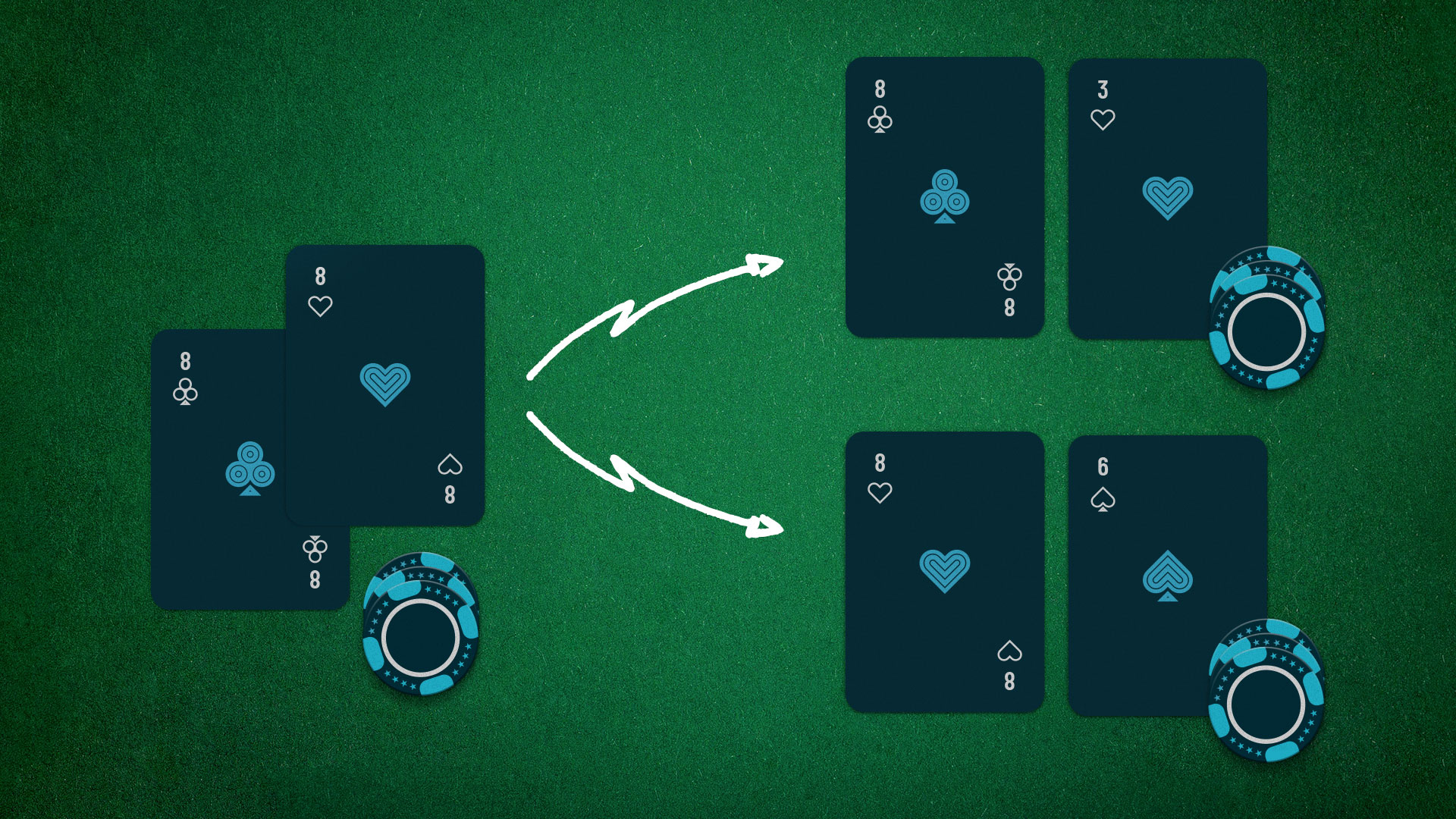
Splitting in Blackjack: When to split and when to avoid
Key decision-making is crucial in the game of blackjack, such as knowing when to split and when not to.
In this guide, we’ll look at the blackjack split technique in detail and cover the following key points:
- What is a "split" in blackjack?
- Rules for splitting in blackjack
- When to split in blackjack
- When not to split in blackjack
What is a "split" in blackjack?
Splitting in blackjack is an action taken to split a pair of cards of the same value into two separate hands, and the dealer provides you with an extra card for each hand. Creating this extra hand means you need to place an additional bet for that hand.

Rules for splitting in blackjack
The rules for being allowed to split a hand are simple.
If you are dealt a pair of the same value, you will be allowed to split your hand. For example, if you are dealt two aces, you are allowed to split that hand into two separate hands.
It’s important to remember that the rules of splitting in blackjack may differ from one blackjack variant to another or depend on the casino in which you play.
Some casinos or blackjack games may limit the ability to split based on the value of your pair (e.g., 10s or aces).
How many times can you split your hand?
According to blackjack split rules, the option to split is only available to players and not the dealer. But how many times you can split will be determined by the game rules of the blackjack variant you have chosen to play, so it is always worth checking these before performing the blackjack split.
In a standard game, blackjack split rules usually allow you to split up to three times, which can result in a maximum of four hands per round.
Can the Dealer Split?
Only players are allowed to split in blackjack. The dealer does not have this option. This is useful from the player’s perspective as you only need to focus on the face-up card and beating that hand.
Why would you choose to split?
Knowing when to split in blackjack is the quintessential element of blackjack strategy.
Splitting can increase your chances of winning if performed at the right time, but can equally put you in a worse position if completed at the wrong time.
Consider these two scenarios:
- Splitting a Hard 20 would be a great example of when you should not split, as this is a great hand with a good probability of beating the dealer. Splitting could likely result in two worse hands that aren't likely to win.
- Splitting a pair of Aces could be a scenario where you do split, as this would create two soft hands, which are considered to be good hands.
When to split in blackjack
Deciding when to split in blackjack will also be determined by the dealer’s upturned card value and must not just be applied blindly every time you receive a pair. Here are some of the best scenarios to split the relevant pairs:
- Splitting aces or 8s: It is always advised to split a pair of aces or 8s, as this can give you the opportunity to make two stronger hands than your original pair can do on its own against the dealer.
- Pair of 2s, 3s or 7s: When the dealer’s upturned card displays the value of 2 through to 7, it is best advised to split. You can potentially make a stronger pair from one of your split hands rather than playing with a weak total of 4, 6 or 14.
- Pair of 6s: Most players will split a pair of 6s should the dealer’s upturned card display a value of 2 through to 6, as this will take full advantage of the dealer’s weak hand and give them a better chance of striking a win.
- Pair of 9s: A total value of 18 is a strong hand against a dealer’s upturned card value of 7. Against a 10 or an ace, it’s probably best to stand and take your chances. However, against any other values, splitting your 9s heightens your winning odds as your one hand of 18 could potentially become two hands of 19 or above.
When you should avoid splitting
As you can see, it is not advised to split every pair you receive, as splitting the wrong pair at the wrong time can significantly decrease your odds of winning.
The value of the dealer’s upturned card must also be taken into consideration when deciding to not split. Here are a few scenarios where splitting is not advised:
- Pair of 4s: Although tempting to split, a pair of 4s does give you a strong starter value of 8, which could potentially draw you a strong total value as opposed to two very weak starter hands that may struggle to improve.
- Pair of 5s: Similar to a pair of 4s, a pair of 5s gives you a firm starting value of 10, which could result in blackjack. Splitting these is more likely to be detrimental to your chances of winning
- Pair of 10s: Whereas the basic strategy always advises to split aces and 8s, it cannot be clearer in its direction to never split a pair of 10s as their total is a hard marker to beat and is the next best thing to 21 or blackjack.